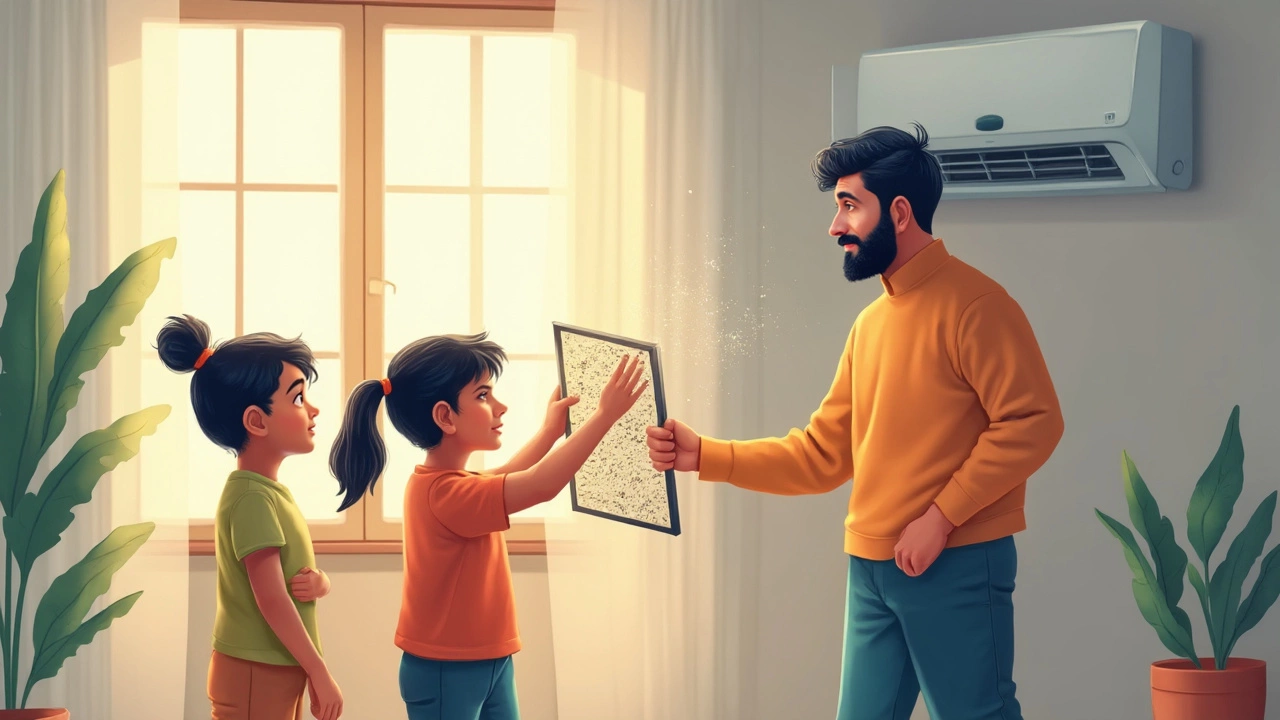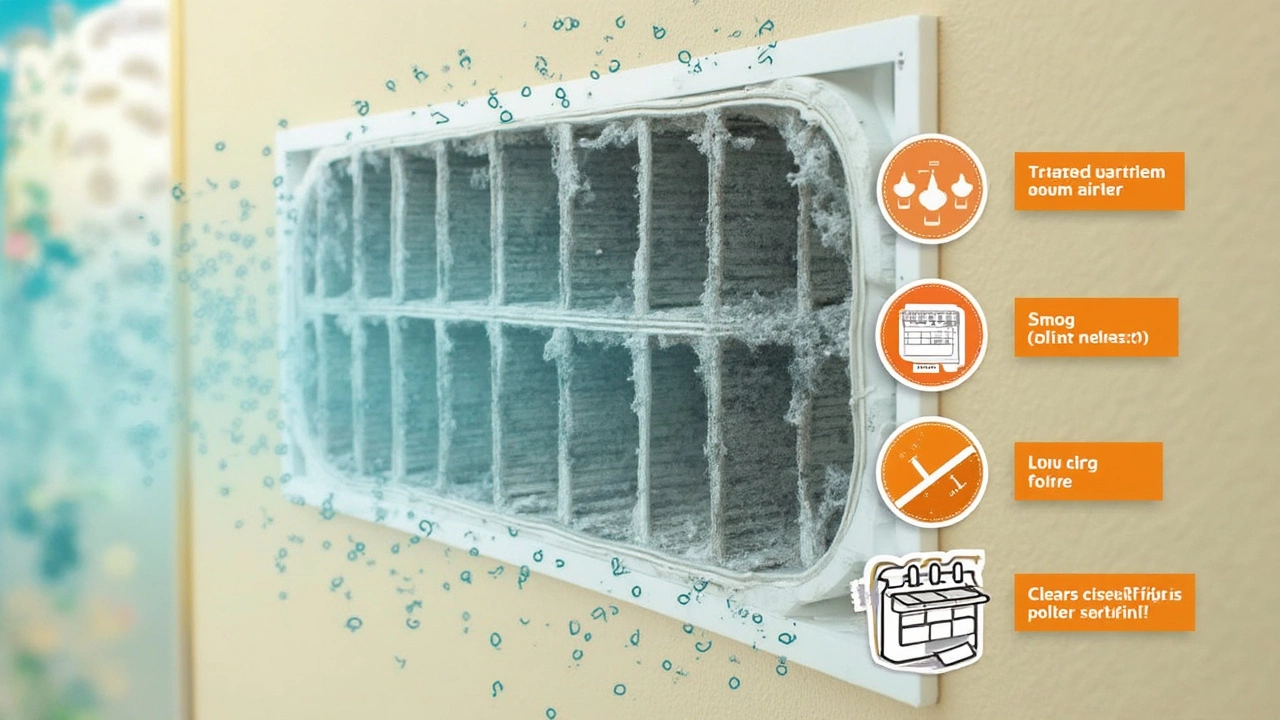 May, 30 2025
May, 30 2025
If you keep forgetting to swap out your air filter, you're definitely not alone. Air filters are one of those home things that are easy to overlook—until your allergies go wild or your AC starts wheezing like it's run a marathon. The weird part is, there isn't just one answer to how often you should change them. It depends on your lifestyle, pets, if anyone smokes, and even the time of year.
Most folks stick to that magic 'every 90 days' rule for typical homes with no pets and average use. But if you've got a couple of furry roommates or someone in the house has allergies, that air filter probably needs a swap every 30 to 60 days. Smokers? You should be changing it even more often. And if you're remodeling or living in a dusty area, monthly changes are your best bet.
Waiting too long to change your air filter isn't just bad for your nose. A clogged filter makes your HVAC system work harder, which means higher bills, less comfort, and even breakdowns. Basically, your air filter isn't immortal—so figuring out when to toss the old one is a smart move for your wallet and your lungs.
- Why Air Filter Changes Matter
- Factors That Change the Timeline
- Telltale Signs It's Time for a New Filter
- Pro Tips to Make Air Filters Last
Why Air Filter Changes Matter
Skipping air filter changes isn't just laziness—it messes with your air quality and your money. When your filter gets packed with dust, pollen, pet hair, and all the other stuff floating in your home, it can't trap new junk. That means your HVAC starts blowing dirty air around the house, making allergies and asthma worse. Changing your air filter is the easiest way to keep your lungs happy and avoid that musty smell no one likes.
Here's another reason to care: your energy bill. The Department of Energy found that replacing a dirty, clogged air filter can lower your system's energy consumption by up to 15%. With the average U.S. household spending close to $2,000 a year on energy, that's real money you could be saving just by remembering a $10 filter.
Ever had your AC or furnace break down at the worst possible moment? A dirty filter forces your system to work harder, which wears out expensive parts like the motor and blower. So instead of paying big bucks for repairs or a new unit, regular filter changes keep things running smoothly. Check out how filter changes impact more than just air:
| Benefit | Dirty Filter | Clean Filter |
|---|---|---|
| Indoor Air Quality | Poor | Good |
| System Efficiency | Decreases | Increases |
| Energy Bills | Higher | Lower |
| Allergy Symptoms | Worse | Reduced |
| System Lifespan | Shortened | Longer |
Think of your air filter like a coffee filter. If you keep running water through it and never change it, you'll end up with gross, weak coffee. Your HVAC needs clean filters or you'll be breathing in junk and paying more for the privilege. So yeah, swapping out that filter? Kind of a big deal for both your health and your wallet.
Factors That Change the Timeline
Different homes chew through air filters at different speeds, and it’s not just about what the calendar says. There’s actually a bunch of stuff that can make you need to swap out your filter sooner or let it ride a little longer.
The first biggie is pets. Got a dog or cat? Even just one can mean way more fur and dander flying around. Experts say if you share your home with pets, you might need to change your filter every 60 days—or even every month during shedding season. Add another pet or two, and it’s a safe bet you’ll be swapping filters monthly.
Then there’s allergies and asthma. If anyone in your home sneezes their way through spring or has asthma, clean air matters even more. A clogged filter does a bad job catching pollen, dust, or mold. So you’ll want to lean closer to that 30-day mark.
Home size is another thing—smaller homes move less air so the filter usually lasts a bit longer. In a bigger place, the HVAC cycles more air, trapping more gunk, which means a faster clog.
If you smoke or let anyone light up in your house, your filter is going to fill up super quick. Cigarette smoke leaves tiny particles that pile up, hurting both your filter and air quality. Builders in your neighborhood? Construction dust is a filter killer. Even big cities with lots of air pollution can fill up a filter months ahead of schedule.
| Situation | Recommended Filter Change |
|---|---|
| No pets, no allergies | Every 90 days |
| One pet | Every 60 days |
| Multiple pets or allergies | Every 30-45 days |
| Smokers in household | Every 30 days |
| Renovation or construction nearby | Every 30 days (or as needed) |
| High urban pollution | Every 30-60 days |
Here’s the bottom line: the more "stuff" floating in your air, the quicker your filter clogs. If you want to keep your home air-friendly, treat that air filter like a regular to-do, not a set-it-and-forget-it part of your house.

Telltale Signs It's Time for a New Filter
Not sure when to swap out your air filter? You don’t have to rely on a calendar. Even if you forget the date, your house and your HVAC will throw hints if your air filter is begging for a change.
- More dust than usual: If you start noticing dust collecting on surfaces faster or your allergies flare up even when you vacuum, it could be your filter is all clogged up.
- Strange smells or musty air: Dirty filters trap odors. If your house just doesn’t smell fresh or every time your system kicks in you notice a weird scent, it’s time.
- Weaker airflow: If the air blowing from your vents seems kinda lame or inconsistent in some rooms, the filter may be blocking the way.
- Noisy HVAC operation: When your system starts making weird noises, don’t assume it’s just old age. Clogged filters make the blower work harder and get louder.
- Visual dirt/gunk: Pop open the cover and check the filter. If it’s gray or you see visible dirt, pet hair, or fuzz, that’s a screaming sign it’s finished its job.
If you want to geek out a bit, check out this table. It breaks down how long common filters last so you know what’s normal, and what’s pushing it.
| Filter Type | Average Lifespan | Special Notes |
|---|---|---|
| Fiberglass | 30 days | Cheap, but clogs fast. Change monthly. |
| Pleated (standard) | 60–90 days | Catches way more dust. Good for homes with pets. |
| HEPA | Up to 12 months | Great for allergies, but pricey and not for all systems. |
| Washable | Up to 5 years (clean monthly) | Must be washed regularly, or they get gross fast. |
The bottom line: don’t trust your luck. If you see any of these signs, don’t wait. Clean air isn’t something you want to gamble with.
Pro Tips to Make Air Filters Last
If you’re tired of blowing cash on new filters, a few smart habits can make your current one go the distance. The trick isn’t to ignore it longer; it’s to make sure it’s not overworked or jammed up with junk before its time. Here’s how you can stretch out the life of your air filter without messing with your air quality.
- Vacuum around the vents monthly. Dust and pet hair pile up fast, especially if you’re running a busy household. If you suck up that extra dirt before it even reaches your filter, you lighten its load a lot.
- Keep doors and windows closed. Every time you open them, you let in pollen, dust, and outside gunk. Tighten things up, especially during pollen season or when the wind kicks up.
- Stick to the right filter size and type. If it’s not the proper fit, air sneaks around and brings in more grime. Plus, the wrong filter can wear out your HVAC faster.
- Check your filter visually each month. Some folks set a phone reminder. A quick peek can catch clogs early and help you avoid surprise replacement costs.
- Change filters seasonally if allergies are a problem. The American Lung Association says,
“For those with allergies or asthma, air filters should be checked and changed as often as every 30 to 60 days, especially during peak pollen seasons.”
- Never run your HVAC with no filter. This dumps all the dust into the system, making things worse in the long run.
Want the numbers? Check this out—changing your filter regularly means your HVAC runs up to 15% more efficiently, according to the U.S. Department of Energy. Here’s a quick look at how filter habits impact things:
| Situation | Recommended Change Frequency | Possible Lifespan Extender |
|---|---|---|
| No pets, light use | Every 90 days | Seal window gaps, vacuum vents monthly |
| Pets, moderate use | Every 60 days | More frequent vacuuming, quality air filters |
| Smokers/allergy sufferers | Every 30-45 days | HEPA filters, keep home extra tidy |
Take a few of these steps, and your filters, wallet, and lungs will thank you.